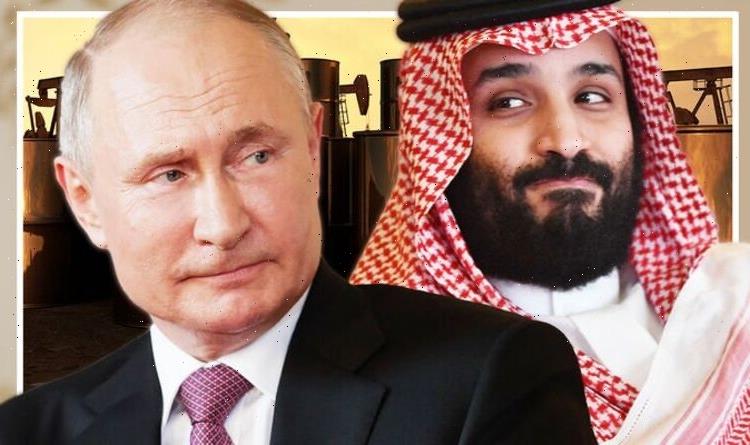Ukraine: Putin's crucial weakness exposed
We use your sign-up to provide content in ways you’ve consented to and to improve our understanding of you. This may include adverts from us and 3rd parties based on our understanding. You can unsubscribe at any time. More info
Russia’s oil trade has been left in disarray after getting slapped with harsh sanctions over its “full-scale invasion” of Ukraine. Importers are rejecting Russian ships and buyers, while producers have postponed sales to Moscow over its brutal attack on its neighbours. But at a time when most of the world appears to be outraged by Russia, Saudi Arabia has signalled a firm commitment to its oil deal with Moscow.
Crown Prince Mohammed bin Salman has reportedly said that Saudi Arabia remains committed to the OPEC + agreement with Russia in the oil markets.
OPEC, or the Organization of the Petroleum Exporting Countries, is an alliance between some of the world’s major oil producing allies.
The OPEC+ coalition involves members like Russia which is not part of OPEC, which struck an agreement for major producers ramp up monthly crude oil production from August 2021.
Oil prices have now skyrocketed to their highest levels in more than seven years this week.
Supplies have been slashed and major disruptions to crude exports from Russia have been caused by sanctions.


But this has not discouraged Saudi Arabia from supporting its oil partners.
The Saudi Press Agency reports: “In this regard, His Royal Highness the Crown Prince affirmed the Kingdom’s keenness on the stability and balance of oil markets and the Kingdom’s commitment to the OPEC Plus agreement.”
Putin also reportedly held a call with Abu Dhabi Crown Prince Sheikh Mohammed bin Zayed al-Nahyan on Tuesday.
The leaders are said to have discussed the OPEC+ deal and pledged to continue coordination on global energy markets, according to Russian and Emirati news agencies.
Members of the OPEC+ oil agreement are set to meet today to discuss new arrangements.

OPEC+ sources told Reuters the group looks poised to strike a deal for a 400,000 barrels per day increase for April.
Since July, the coalition has been boosting that amount of oil each month to make up for heavy cuts to production made over the last two years.
This is because demand for fuel had plummeted be despite Russia’s horrific actions in Ukraine.
Louise Dickson, senior oil market analyst at Rystad Energy, said Russia’s attack on Ukraine has made its crude oil “one of the most toxic barrels on the market”.
Russia may also see its oil exports slashed as it requires more fuel for its military attacks.
DON’T MISS
Putin’s nuclear threat to UK: Nine locations that could be obliterated [INSIGHT]
Biden humiliated as Putin set for major new energy deal [REPORT]
Ancient Egypt breakthrough after prehistoric discovery: ‘World’s first [REVEAL]

Amy Myers Jaffe, from the Climate Policy Lab at Tufts University said: “Doing an invasion of the scale Russians are doing in Ukraine requires a lot of fuel, so their domestic use is going to go up.
“So presumably, we’re going to see less exports of Russian oil, unless they increase production because their demand’s going up.”
But over the last few years, Moscow’s partnership with Saudi Arabia has grown stronger.
The two countries are the largest crude oil producers in the world, giving them an unprecedented ability to collude in oil export decisions.
Bruce Riedel, a senior fellow at the Brookings Institution said: “Putin and MBS have much in common, including murdering their critics at home and abroad, intervening in their neighbours by force and trying to get oil prices as high as possible.

“Putin will do MBS a great service if he invades Ukraine and sends oil prices through the roof.”
Russia ships out 4 million to 5 million barrels per day (bpd) of crude, along with 2 million to 3 million bpd of refined products.
But Moscow may run into problems selling its barrels as buyers are reportedly refusing oil delivered by the Caspian Pipeline Consortium via Kazakhstan.
The CPC delivers over 1 million bpd from Kazakhstan, which Chevron Chief Executive Mike said is an “an important source” which “the world really needs right now”.
Source: Read Full Article
